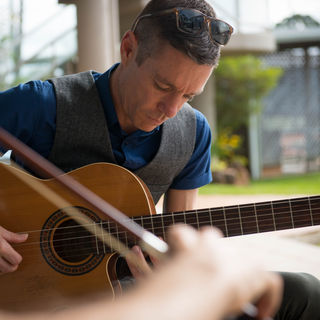
INTRODUCTION
TO MUSIC

The true purpose of music is to nourish and confirm who we are.
Throughout history music has been and remains a powerful form of human expression. Traditionally music has been a means for a culture and or sub cultures to come together and express the values and traditions of their people. Music and song (waiata) communicate historical and mythological stories, warnings, life lessons to younger generations, love, laments, tributes to those who have died, and the welcoming of new life.
Central to cultural and social gatherings, singing, playing and/or listening to music together can be a joyful and connecting experience. Although differing in instrumentation, language and genre the common thread running through all music is its ability to move us, physically, emotionally and spiritually. Music can speak what we find difficult to express and give expression to that which we deeply feel. We rate good music not only by the talent of the musicians but also by their ability to make us feel; the more the better.
It is curious that a set of pitched notes of differing tones, played at varying lengths and rhythms, with or without language, can arouse deep and intense emotion. We can be filled with joy, moved to tears of sadness or longing, can feel enlightened, inspired, or have our anger or frustration fuelled. We can be roused to act, to withdraw, reflect or reminisce. Why does music have the power to move us in all these different ways?
Scientific research has shown that dopamine, the ‘feel good hormone’ that is activated by pleasurable experiences such as food and sex, arousing feelings of euphoria and cravings, is also released when we are listening to music. In fact, studies show that dopamine arousal is at its peak when we are listening to music. It is music’s ability to change our brain chemistry that leads people to use it like a drug, one that changes our emotional state of being.
This makes sense of the craving to listen to ‘that new song’ over and over again. Music serves up the emotion we need at a particular time. Music is also a form of energy and as the sound waves travel through our bodies in the form of vibrations they permeate our bodily systems and we absorb this energy.
Have you ever stopped to consider just what you are absorbing when listening to a song?
Could it be more than just the energy of sound and include the emotions of the musician, their joys and sorrows, anger or angst?
In this article, singer/songwriter Rachael Kane shares her experience of becoming aware of how music affected her through the emotions being expressed in songs.
Just like Kai (Food)
Unlike the food we eat and other substances we take into our bodies, music is unseen. We know from science that sound is energy, that it is absorbed by the body and therefore has an effect on the body. Is it because music is unseen that we tend not to question or consider its effects on us?
We know there are foods that truly nourish our bodies. However, we often choose foods that don’t nourish or support us because we want the sweetness, a lift, a reward or to be comforted, overriding what our body truly needs. Is it possible that we use music in this same way? Just because it sounds good to us doesn’t mean that it’s truly good for us.
Could the emotion in music deplete or even damage our bodies
just like some food and drink does?
We use the emotion in the break up song to comfort our hurt or justify our blame, the uplifting song feeds us a sense of confidence and the political song rallies us. Our craving is satisfied, but only momentarily, and we find we are still left with a sense of longing.
The continually growing list of famous rock stars who have died from overdoses and suicide leaves a question as to how the music they wrote, played and sang also contributed to emotionally depleting and or damaging them and then what of the effects on their listeners ?
So next time you listen to a song take a moment to feel what is happening in your body. How does your mood change? And are you left feeling nourished or empty?
At a time when our world is experiencing much pain and suffering on a personal, local and global level, music offers the opportunity to be a form of expression that supports in healing, nourishing and confirming who we truly are. Instead of a sweet empty treat that acts as a temporary fix, we can look to understanding and discerning the true quality of music and begin to explore what our responsibilities may be as buyers, makers, sellers and distributors of music.
You can read about one woman’s experience of observing the effects of music over a 1-week period below.


